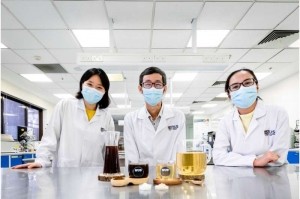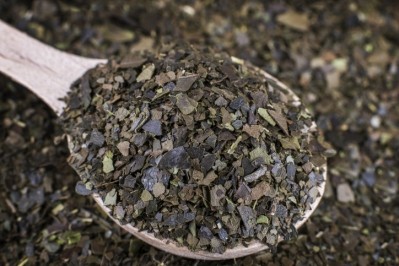Researchers wake up the gut with new probiotic tea, coffee

The two doctoral students who worked on the gut-friendly beverages said the drinks not only taste great, but can be stored chilled or at room temperature for more than 14 weeks without compromising on the probiotics.
"Coffee and tea are two of the most popular drinks around the world, and are both plant-based infusions. As such, they act as a perfect vehicle for carrying and delivering probiotics to consumers. Most commercially available probiotic coffee and tea drinks are unfermented. Our team has created a new range of these beverages using the fermentation process as it produces healthy compounds that improve nutrient digestibility while retaining the health benefits associated with coffee and tea," explained Liu Shao Quan from the Department of Food Science and Technology at the Faculty of Science, the associate professor who supervised the research and development.
The process
Alcine Chan and Wang Rui, both doctoral students from NUS Food Science and Technology, added nutrients into their coffee and tea along with specific probiotics. From there, the tea is left to ferment for two days and the coffee one day. Once the fermentation process is complete, the beverages are ready to drink.
Rui said any kind of brewed tea can be used in this process, and throughout the fermentation process, the original flavor of the tea is still prominent.
"The probiotic tea tastes like fruit tea with a little bit of acidity, and a similar mouthfeel to the original tea. Drinkers can add sweeteners and milk, or cream, based on their preferences," noted Rui.
Chan said that she concocted several prototypes: "Some of the probiotic coffees give better-balanced acidity, some give better mouthfeels, some have deeper smoky flavors, and some can retain the coffee flavor better after long-term storage."
Chan added that the process is easier said than done. “The formulation is tricky, especially relating to the type and amount of nutrients added, and the probiotic combination. Not every type of probiotic can grow in coffee brews. Adding too few nutrients will not enable probiotic growth while adding too many nutrients will give an unpleasant taste.”
Indeed, choosing the right strain can be challenging. Lactobacillus and Bifidobacterium are the most common strains used in probiotic beverages, with Bacillus a manufacturer favorite due to its viability in extreme production processes.
Health benefits
The researchers note that the caffeine content is not compromised in the making of the probiotic coffee. It also maintains its chlorogenic acid content, which has been linked to health benefits, such as lowering blood sugar levels and decreasing insulin spikes by reducing carbohydrate absorption in the digestive tract.
Antioxidants, anti-inflammatory properties and other health benefits have been linked to polyphenols in tea. The researchers explained that their method uses their patented fermentation process which allows the polyphenol contents from the tea to be retained. Additionally, the antibacterial agent phenyllactate is produced after fermentation.
Each serving of both probiotic tea and probiotic coffee contains at least 1 billion units of live probiotics, the daily amount recommended by the International Scientific Association for Probiotics and Prebiotics.
Probiotic beverages get a jolt
The NUS team said they filed a patent for the probiotic coffee recipe and hope to collaborate with industry partners to commercialize the drink.
The global probiotic drink market is lucrative, with a value of $13.65 billion in 2019 and expected to expand at a CAGR of 6.1% from 2020 to 2027, according to Grandview Research.
Rising health awareness among the consumers, especially amid the pandemic, has fueled the demand. A survey by Kerry Group found that more than 75% of the consumers in the US and over 50% of consumers worldwide are aware of probiotic’s digestive health benefits. Google searches for “microbiome” increased by 267% from 2014 to 2019.
While dairy-based probiotic beverage products have traditionally held the largest revenue share, the plant-based product segment is expected to witness the fastest growth over the forecast period — promising news for the NUS team.

















